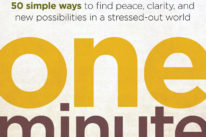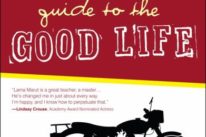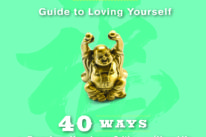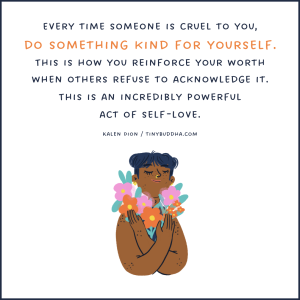Note: The winners for this giveaway have been chosen. Subscribe to Tiny Buddha for free daily or weekly emails and to learn about future giveaways!
The Winners:
Growing up, I was a black-and-white thinker—it was always all or nothing. This way of being rarely served me well when it came to healthy habits, because the little things really do all add up; and usually, something is better than nothing.
This is what I most appreciated about Patricia Monaghan’s book, Meditation – The Complete Guide (recently revised and celebrating its 10th anniversary). It’s not a book that lays out a specific, rigid system entailing an hour of consistent daily practice.
It’s a book that explores 50 different ideas to help us live more fully in the present, including a few that may surprise you.
From New World Library:
An easy-to-use self-test on personal habits and preferences directs readers to choose a practice to fit their tastes and circumstances. The authors describe all the major forms of Eastern and Western religious practice—from Christianity, Judaism, and Islam to the traditions of India, Japan, China, and Tibet.
Readers can explore techniques derived from Asian and African customs or meditations simply found in life practices such as sports, gardening, and creative arts. Meditation – The Complete Guide is designed for all readers, from the beginning meditator to the healing professional, with chapters on practices to heal physically, emotionally, and mentally.
The Giveaway:
To enter to win 1 of 2 free copies of Meditation – The Complete Guide:
- Leave a comment below
- Tweet: RT @tinybuddha Book Giveaway & Interview: Meditation – The Complete Guide http://bit.ly/rA8af0
If you don’t have a Twitter account, you can still enter by completing the first step. You can enter until midnight PST on Sunday, December 18th.
The Interview:
1. What motivated you to write this book?
When the American Medical Association accepted meditation as a treatment for hypertension, insomnia, and chronic pain, my co-author and I became aware that many people attempt meditation but then give up.
In many cases, they attempted a practice that was the wrong “fit” for them for religious, physical or other reasons. We began gathering information about multiple forms of meditation for such people and then found the information could enrich even those who already have a favored meditative practice.
2. You explore 50 different meditation practices in your book and you’ve included a quiz to help people identify their ideal meditation style. How did you discover which meditation style works best for you?
First, become aware of the many options. Select one or two practices that seem appropriate to your needs, desires and lifestyle. Then practice for awhile. Learning to meditate takes time, so don’t give up after a week or even a month.
After a few months of practice, you should look forward to meditating. If you procrastinate about meditating, try another form.
3. You included some practices that aren’t commonly considered meditation, such as journal writing. How do you define meditation?
A practice, which may be religious or secular, that centers you in the immediate, the present moment. A practice that quiets the busy mind. A practice that allows you to detach from striving for a time and center yourself in something beyond your ego. There are other ways to define meditation, but these are found in most meditative practices.
4. Have you found that people often shy away from meditation solely because they had a less than ideal experience with one particular style?
Absolutely! The typical meditation drop-out enrolled in a class just called “meditation” and then decided it “didn’t work for me” or that “I just can’t meditate.” This often happens when the teacher is adamant that there is only one way to meditate—after defining meditation in a way that, indeed, only their way fits! Anyone can meditate.
5. What other factors do you think contribute to the hesitancy to start a mediation practice?
Some people fear that meditation means practicing another religion. For instance, some Christian preachers discourage the practice of yoga because it descends from Hindu (and even pre-Hindu) Indian religion, although it is perfectly possible to practice hatha yoga without worshiping Shiva and Kali.
Others feel that meditation involves extremely rigorous rules that they might feel inadequate to follow. Yet many forms of meditation are somewhat flexible in practice.
Finally, people might feel that they must be physically very fit to engage in meditative practice; they are usually thinking of yoga or another movement meditation. Yet even such practices can be adapted for those who have physical limitations.
6. Why is so important to incorporate meditation into our lives?
Modern life is fast and loud. Meditation is slow and quiet. We need the balance of meditation!
7. Is Meditation: The Complete Guide a book for beginners, or can this book also help more advanced practitioners deepen their practice?
Beginners certainly will find the book useful. But I would not be so bold as to say that advanced practitioners can deepen their practice from the short introductions to each tradition that we provide.
However, they will find the philosophical background and the extensive resource lists useful. And even advanced practitioners will find other options that they had not fully considered—for we are all beginners at some things, even when advanced in other ways.
8. What tips would you offer someone who is new to meditation?
Meditation is not a theory. It’s a practice. Find one or two forms of meditation and try them out for six months, and then re-evaluate. If you don’t feel they are the most suitable, try another form.
Also: most people can find 15 minutes a day to practice. Few can find an hour. Don’t set yourself up by promising to meditate for a long time every day. Constant regular practice is the goal.
Learn more about Meditation – The Complete Guide on Amazon.
FTC Disclosure: I receive complimentary books for reviews and interviews on tinybuddha.com, but I am not compensated for writing or obligated to write anything specific. I am an Amazon affiliate, meaning I earn a percentage of all books purchased through the links I provide on this site.
About Lori Deschene
Lori Deschene is the founder of Tiny Buddha. She’s also the author of Tiny Buddha’s Gratitude Journal, Tiny Buddha's Worry Journal, and Tiny Buddha's Inner Strength Journal and co-founder of Recreate Your Life Story, an online course that helps you let go of the past and live a life you love. For daily wisdom, join the Tiny Buddha list here. You can also follow Tiny Buddha on Facebook, Twitter, and Instagram.
- Web |
- More Posts














 Though I run this site, it is not mine. It's ours. It's not about me. It's about us. Your stories and your wisdom are just as meaningful as mine.
Though I run this site, it is not mine. It's ours. It's not about me. It's about us. Your stories and your wisdom are just as meaningful as mine. 